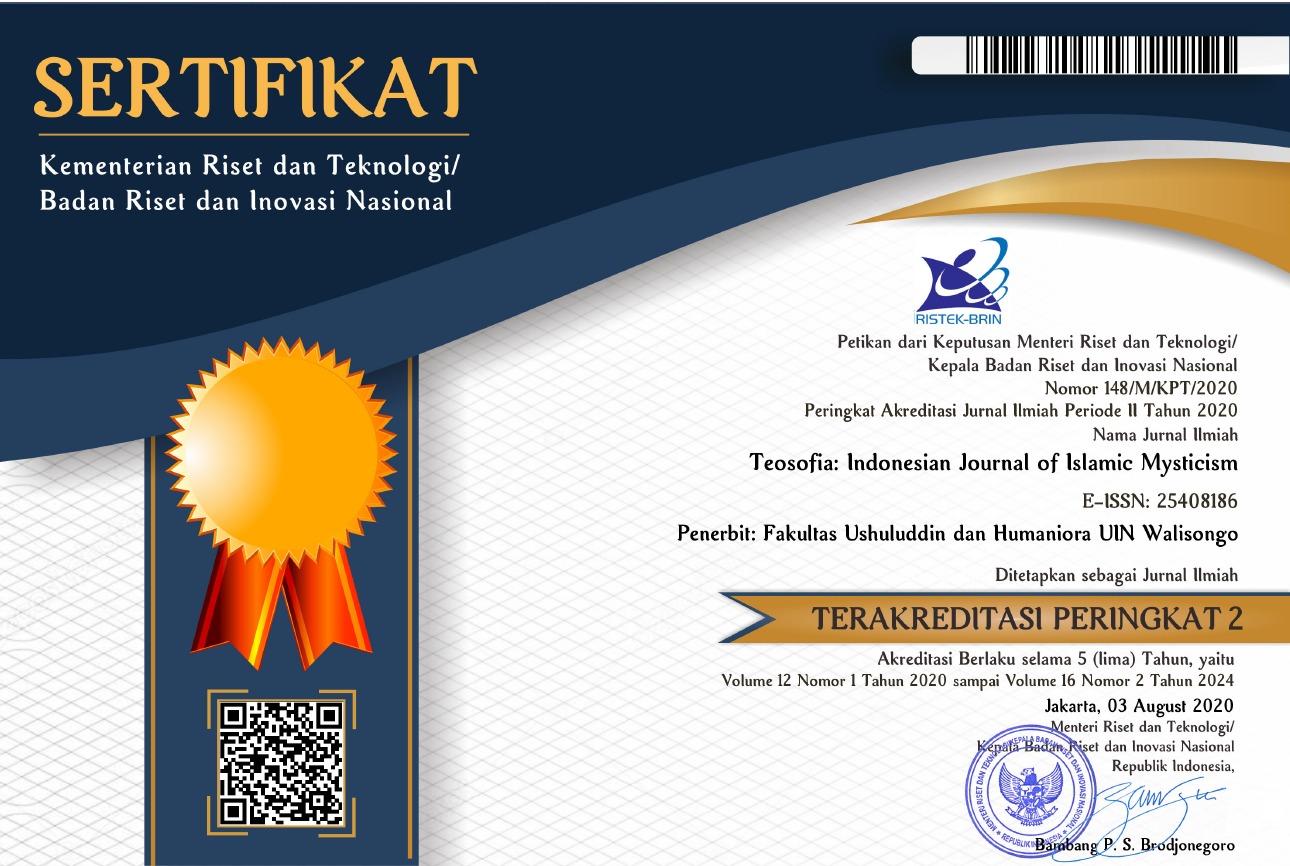Urban Sufism from Exclusiveness to Inclusiveness: A Metaphysical Perspective
DOI:
https://doi.org/10.21580/tos.v11i2.14522Keywords:
sa'āda, urban sufism, metaphysicsAbstract
Every human being looks for sa'āda (happiness) in this world. However, this paradigm has recently shifted. It is now emerging amid urban communities, especially among Indonesian Muslims searching for spiritual values. This qualitative study aims to answer the above argument using a sufistic approach by analysing human nature and the nature of happiness, which are the factors supporting the birth of urban sufism. Besides, it also uses a phenomenological approach to see urban sufism, especially in the cities of Jakarta and Bandung, as an example of the development of urban sufism. This study found that the paradigm shift was caused by the revival of human awareness that the spiritual aspect is a source of true happiness within human beings.
Contribution: This article provides a rational reason to show that sufism is not only for certain circles but is universal and needed for every human being, especially for the conditions of this era. Every human needs sufism as it is a metaphysical human element consisting of Nūr Muḥammadiyy and Adamiyy
Downloads
References
‘Afiifah, Nisa Shofiyatul. ‘Relevansi Epistemologi, Jiwa Dan Akal Dalam Perspektif Ibnu Thufail’. Al-Ibrah 5, no. 1 (2020): 120–42. https://ejournal.stital.ac.id/index.php/alibrah/article/view/93.
Abdul Hamid. ‘Agama Dan Kesehatan Mental Dalam Perspektif Psikologi Agama’. Jurnal Kesehatan Tadulako 3, no. 1 (2017): 1–14. http://jurnal.untad.ac.id/jurnal/index.php/HealthyTadulako/article/view/8714.
Algar, Hamid. ‘Sufism: A New History of Islamic Mysticism By Alexander Knysh’. Journal of Islamic Studies 30, no. 1 (1 January 2019): 97–103. https://doi.org/10.1093/jis/ety050.
Anis, Muhammad. ‘Spiritualitas Di Tengah Modernitas Perkotaan’. Jurnal Bayan 2, no. 4 (2013): 1–15. https://s3ppi.umy.ac.id/wp-content/uploads/2017/04/Spiritualitas_di_Tengah_Modernitas_Perko.pdf.
Araby, Ibnu. Futuh Al Ghaib. Vol. 1. Beirut: Dar El Kutub Al Ilmiah, n.d.
Arroisi, Jarman. ‘Bahagia Dalam Perspektif Al-Ghazali’. Kalimah: Jurnal Studi Agama Dan Pemikiran Islam 17, no. 1 (1 March 2019): 89–103. https://doi.org/10.21111/klm.v17i1.2942.
Banusu, Yakobus Ori, and Antonius Denny Firmanto. ‘Kebahagiaan Dalam Ruang Keseharian Manusia’. Forum: Filsafat Dan Teologi 49, no. 2 (19 December 2020): 51–61. https://doi.org/10.35312/forum.v49i2.301.
Fathurrahman, Oman. ‘Urban Sufism: Perubahan Dan Kesinambungan Ajaran Tasawuf’. Indonesian Islamic Philology, 2007. http://oman.uinjkt.ac.id/2007/01/urban-sufism-perubahan-dan.html.
Fauzan, M Nanda. ‘Gairah Spiritual Kelompok Urban Sufisme Di Tengah Maraknya Wabah Covid-19’. Islamika: Jurnal Ilmu-Ilmu Keislaman 21, no. 01 (25 August 2021): 62–75. https://doi.org/10.32939/islamika.v21i01.628.
Hamka. Tafsir Al-Azhar. Vol. 4. Singapura: Pustaka Nasional PTE LTD, 1999.
Hasyim, Wakhid, Ahmad Syafii, and Arifah Fauziah. ‘Urban Sufism: Spiritulity Education For Middle Class Muslim’. Forum Paedagogik 13, no. 2 (1 January 2022): 262–77. https://doi.org/10.24952/paedagogik.v13i2.6466.
Ifansyah Putra. ‘Urban Sufisme: Negoisasi Antara Islamisme Dan Modernisme Kalangan Muda Perkotaan (Studi Analisis Provinsi Bengkulu)’. Jurnal Aghinya 2, no. 2 (2019): 190–204. https://ejournal.stiesnu-bengkulu.ac.id/index.php/aghniya/article/view/51.
Ihsan, Nur Hadi, and Iqbal Maulana Alfiansyah. ‘Konsep Kebahagiaan Dalam Buku Tasawuf Modern Karya Hamka’. Analisis: Jurnal Studi Keislaman 21, no. 2 (30 December 2021): 279–98. https://doi.org/10.24042/ajsk.v21i2.9636.
Jati, Wasisto Raharjo. ‘Sufisme Urban Di Perkotaan: Konstruksi Keimanan Baru Kelas Menenengah Muslim’. Jurnal Kajian & Pengembangan Manajemen Dakwah, 5, no. 2 (2015): 175–99. https://www.academia.edu/20024258/Urban_Sufisme_Konstruksi_Keimanan_Baru_Kelas_Menengah_Muslim_Indonesia.
Karyadi, Agus Jemi. ‘Falsafah Empan Papan Berdialog Dengan Richard Rorty Tentang Batas Toleransi’. Jurnal Ilmu Budaya 8, no. 2 (6 August 2020): 235–46. https://doi.org/10.34050/jib.v8i2.10989.
Lone, Niyaz Ahmad. ‘The Role and Significance of Taṣawwuf in Modern-Day Crisis’. Teosofia: Indonesian Journal of Islamic Mysticism 11, no. 1 (16 June 2022): 83–102. https://doi.org/10.21580/tos.v11i1.12030.
Muh. Ilyas Syarifuddin. ‘Urban Sufisme Dan Politik (Studi Terhadap Relasi Majelis Zikir Jami’atul Mubarakh Kota Makassar Dengan Elite Politik)’. Universitas Islam Negeri Alauddin Makassar, 2018.
Muqit, Abd., and Eko Zulfikar. ‘Tuhan Dalam Fitrah Manusia Dan Faktor-Faktor Yang Merubahnya: Kajian Tematik Ayat-Ayat Dan Hadis Ketauhidan’. JURNAL YAQZHAN: Analisis Filsafat, Agama Dan Kemanusiaan 7, no. 2 (13 December 2021): 152–68. https://doi.org/10.24235/jy.v7i2.8019.
NU Online. ‘“Urban Sufisme”, Perkembangan Positif Dalam’. nu.or.id, 2017. https://www.nu.or.id/warta/quoturban-sufismequot-perkembangan-positif-dalam-dakwah-islam-lLYN1.
Rahman, Fadli. ‘Urban Sufism Kajian Fenomenologis Terhadap Kecendrungan Bertasawuf Masyarakat Kota Palangka Raya’. Jurnal Studi Agama Dan Masyarakat 6, no. 1 (2009): 35–60. https://fauziannor.files.wordpress.com/2013/03/urban-sufism-kajian-fenomenologis-terhadap-kecendrungan-bertasawuf-masyarakat-kota-palangka-raya-fadli-rahman.pdf.
Rubaidi, Rubaidi. ‘Kontekstualisasi Sufisme Bagi Masyarakat Urban’. Jurnal THEOLOGIA 30, no. 1 (10 June 2019): 127–52. https://doi.org/10.21580/teo.2019.30.1.3145.
Saprillah, Saprillah, Hamdan Juhannis, Nurman Said, and Hamzah Harun Al-Rasyid. ‘Kontestasi Keagamaan Dalam Masyarakat Muslim Urban’. Al-Qalam 26, no. 1 (29 June 2020): 39–56. https://doi.org/10.31969/alq.v26i1.844.
Saryono. ‘Konsep Fitrah Dalam Perspektif Islam’. Medina-Te: Jurnal Studi Islam, 12, no. 2 (2016): 161–74. https://doi.org/10.19109/medinate.v12i2.1179.
Siadeka, Guslita. ‘Spiritualitas Masyarakat Urban (Studi Terhadap Gerakan Shalat Subuh Berjamaah Di Banda Aceh)’. UIN Ar-Raniry Banda Aceh, 2017.
Siti Halimah. ‘Tasawuf Untuk Masyarakat Modern’. Jurnal Al-Makrifat 2, no. 1 (2017): 85–98. http://ejournal.kopertais4.or.id/tapalkuda/index.php/makrifat/article/view/3027.
Sorgenfrei, Simon. ‘Hidden or Forbidden, Elected or Rejected: Sufism as “Islamic Esotericism”?’ Islam and Christian–Muslim Relations 29, no. 2 (3 April 2018): 145–65. https://doi.org/10.1080/09596410.2018.1437945.
Suhada, Ade Anang, Muliadi Muliadi, and Dodo Widarda. ‘Kebahagiaan Menurut Syeikh Ibnu Atha’illah as-Sakandari’. Jurnal Penelitian Ilmu Ushuluddin 2, no. 1 (22 January 2022): 180–97. https://doi.org/10.15575/jpiu.13590.
Suharto, Yusuf, and Ishmatun Nihayah Ishmah. ‘Tasawuf Kebahagiaan Dalam Pandangan Al-Ghazali’. PUTIH: Jurnal Pengetahuan Tentang Ilmu Dan Hikmah 6, no. 2 (2021): 33–46. http://journal.mahadalyalfithrah.ac.id/index.php/PUTIH/article/view/6.
Suriadi. ‘Aplikasi Konsep Fitrah Dalam QS. Al-Rum Ayat 30 Terhadap Tujuan Pendidikan Islam’. At-Tajdid: Jurnal Ilmu Tarbiyah, 7, no. 1 (2018): 71–107. https://ejournal.isimupacitan.ac.id/index.php/tajdid/article/view/117.
Suyanta, Sri. ‘Kisah Ibrahim Mencari Tuhan Dan Nilai-Nilai Pendidikan Islam’. Jurnal Ilmiah Islam Futura 6, no. 2 (25 April 2018): 100–118. https://doi.org/10.22373/jiif.v6i2.3051.
Yilmaz, Feyzullah. ‘Overcoming Nihilism Through Sufism: An Analysis of Iqbal’s Article on ʿAbd Al-Karīm Al-Jīlī’. Journal of Islamic Studies 30, no. 1 (1 January 2019): 69–96. https://doi.org/10.1093/jis/ety041.
Downloads
Published
How to Cite
Issue
Section
License
Copyright
The copyright of the received article shall be assigned to the journal as the publisher of the journal. The intended copyright includes the right to publish the article in various forms (including reprints). The journal maintains the publishing rights to the published articles. Therefore, the author must submit a statement of the Copyright Transfer Agreement.*)
Licensing

This work is licensed under a Creative Commons Attribution-ShareAlike 4.0 International License.
In line with the license, authors are allowed to share and adapt the material. In addition, the material must be given appropriate credit, provided with a link to the license, and indicated if changes were made. If authors remix, transform or build upon the material, authors must distribute their contributions under the same license as the original.
_______
*) Authors whose articles are accepted for publication will receive confirmation via email and send a Copyright Transfer Agreement.








